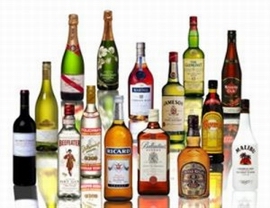 The Missouri House has advanced liquor legislation that has been the topic of intense lobbying and several lawsuits recently, by tying the proposal to a homebrewed beer bill that — in contrast — has drawn relatively little attention this session.
The Missouri House has advanced liquor legislation that has been the topic of intense lobbying and several lawsuits recently, by tying the proposal to a homebrewed beer bill that — in contrast — has drawn relatively little attention this session.The move just the latest in a complicated battle over relationships between liquor suppliers and the distributors who get wine and spirits to Missouri retailers for consumers to buy. At issue is whether the government has any role or responsibility in those deals.
The proposed legislation would make it more difficult for alcohol suppliers to sever their relationships with distributors by deeming those relationships as "franchises."
The liquor franchise legislation — proposed in both the House and Senate earlier this year — appeared to have been stalled in committee until it was revived as an amendment to the beer bill Wednesday. The underlying legislation would allow homebrewers to pour their beers at festivals, competitions and charity events but not sell them – a response to an unexpected ban on homebrewed beer at last year’s St. Louis Brewers Heritage Festival.
Only one senator voted against the beer bill, sans liquor franchise language, when it passed the chamber last month.
The amendment tying the liquor bill to the beer bill passed the House Wednesday in a bipartisan 112-47 vote – enough in favor to override a gubernatorial veto if lawmakers stick to their positions. The full bill passed the floor 110-48.
The proposal still needs approval in the Senate, and the session ends in less than two weeks.
The House had little discussion on the underlying homebrew bill, but spent nearly two hours debating the liquor franchise part. It was the first time the change has had a debate on the floor of either chamber this session.
“This bill started out as a homebrew bill obviously it has changed into something bigger – probably more important,” said Rep. Caleb Jones, R-California.
The issue has been brewing for several months.
After a 2011 federal court ruling overturned a state law that had been governing the relationship between suppliers and distributors since 1975, some of the country’s largest liquor suppliers began filing lawsuits to end deals with local distributors.
Opponents of the proposed legislation, modeled from the pre-2011 system, say it inserts government into activities that should be left to the free market.
“It’s not the government’s role to legislate business relationships,” said Ben Jenkins, spokesman for the Distilled Spirits Council, a Washington-based trade group that represents spirits suppliers including St. Louis-based Luxco. “If this legislation passes, wholesalers will have no incentive to meet the needs of suppliers since there will be no consequences for their actions. No matter how the wholesaler operates, the supplier will be forced by the government to maintain the relationship. If a wholesaler doesn’t want to lose a brand, they should compete to keep it – not pass anticompetitive laws that prevent competition.”
But proponents say inaction on the bill will lead to consolidation in the industry and hurt Missouri businesses.
Sue McCollum, CEO of St. Louis-based Major Brands, the state’s largest distributor, said the legislation will protect thousands of jobs in Missouri.
“This bill would restore the regulatory framework that has existed since prohibition but was weakened by a federal court,” she said.
The issue has drawn intense interest in the state Capitol. St. Louis Mayor Francis Slay watched the House debate from the gallery Wednesday, as did many lobbyists.
Lawmakers say they have been bombarded with calls and emails from supporters and opponents of the proposed liquor law. Nearly three dozen lobbyists have been working the issue in the halls of the state Capitol.
Rep. Todd Richardson, R-Poplar Bluff, said he decided to delve deeper in to the liquor debate “after hearing from every lobbyist in the building.”
Rep. Kevin Engler, a Republican from Farmington who proposed the amendment carrying it, said he hoped to bring an end to the robocalls against the legislation.
“Either get it out or kill it today,” Engler said. “Make a decision, and let’s go forward.”
Richardson said he decided to support the legislation after learning that the current setup was created through a judge’s ruling. Missouri previously had a liquor franchise law on the books before the lawsuit.
“If the rules of the game are going to change, they ought to change because this General Assembly makes an informed policy decision to change the law,” Richardson said.
The liquor bill carves out exceptions for small breweries and wineries – addressing one of the key points made by critics of last year’s version of the bill. Gov. Jay Nixon noted last year that legislation without a carve-out could impact small suppliers, including Missouri wineries and microbreweries.
But Nixon also expressed concern over the bill’s potential to lock suppliers into contracts with wholesalers, "with no effective means of relief.”
"In this situation, competition is diminished, the consumer inevitably suffers and Missouri agriculture is harmed,” Nixon wrote in his July 12 veto message.







